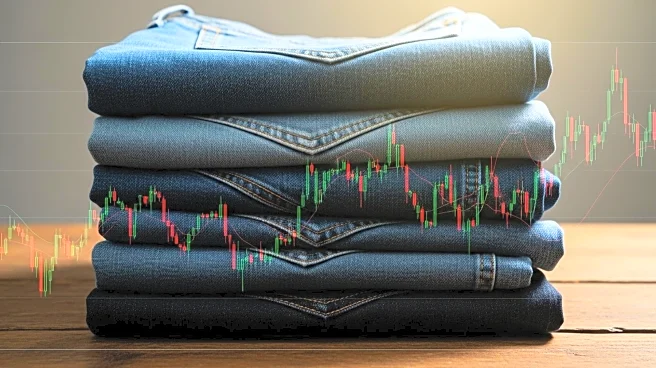What is the story about?
What's Happening?
Levi Strauss & Co. reported robust third-quarter earnings for 2025, with revenue reaching $1.54 billion, a 7% increase year-on-year, surpassing analyst expectations. The company saw significant growth in direct-to-consumer sales, which rose by 11%, and e-commerce sales, which jumped 16%. Despite these positive results, Levi's stock fell by 5-6% in after-hours trading due to cautious forward guidance that slightly missed Wall Street expectations. The company raised its FY2025 revenue outlook to $6.5-6.6 billion, reflecting a 3% year-over-year growth, but this was not enough to satisfy investors looking for a stronger beat.
Why It's Important?
Levi Strauss's performance highlights the growing demand for denim, particularly Y2K-inspired styles, which have driven sales in key markets like Europe and the Americas. The company's strategic pivot to direct-to-consumer sales is paying off, allowing it to maintain pricing power and improve profitability. However, the stock's decline underscores the high expectations from Wall Street and the challenges of meeting investor demands in a competitive retail environment. Levi's international diversification, especially in Asia and Europe, is a key strength, helping to offset domestic market pressures.
What's Next?
Levi Strauss faces the crucial holiday quarter with momentum but also challenges, including elevated tariffs and consumer demand volatility. The company plans to leverage its global brand campaigns and new product collections to drive holiday sales. Longer-term, Levi's aims to expand its direct-to-consumer sales, deepen international market penetration, and grow its product lines. Analysts generally believe Levi's can achieve mid-single-digit revenue growth and faster earnings growth, but the stock's valuation suggests the market needs evidence of this trajectory to push shares higher.
Beyond the Headlines
Levi Strauss's emphasis on sustainability and ESG initiatives, such as aiming for net-zero emissions by 2050, aligns with consumer values and provides long-term brand goodwill. The company's strategic moves, including the sale of the Dockers brand, indicate a focus on core business areas and growth segments like women's apparel and activewear. These efforts, coupled with strong execution and brand relevance, position Levi's as a resilient industry leader despite retail sector challenges.















